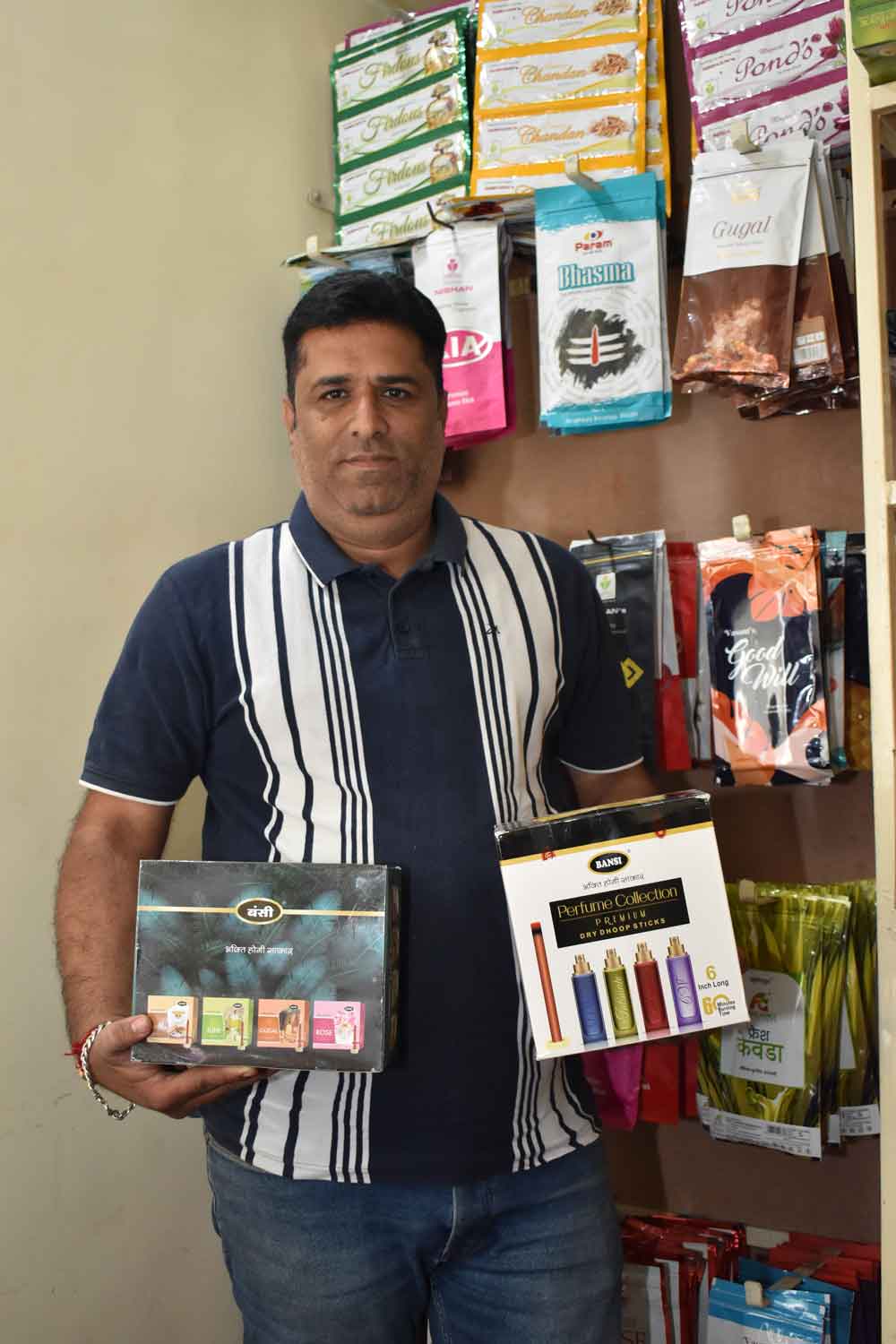
Loose products are a challenge for Brands: Gulshan Manwani, Devansh Agency
Mr Gulshan Manwani, head of Devansh Agency, brings 25 years of experience in the incense and dhoop industry. In a recent conversation with Sugandh India, he discussed the role of Nagpur as a hub for incense production and consumption. However, Manwani noted that the expected sales figures have not materialised as anticipated. Despite large-scale production in the district, incense prices remain lower than expected due to fierce competition. While branded incense packs are priced at ₹70-80, customers in Nagpur often prefer purchasing 1 kilogram of loose incense for the same price. Similarly, Sambrani cups, sold by companies for ₹50 for a dozen, are available for ₹100-150 per kilogram (in loose). Manwani attributed the dominance of local producers as a key element hindering branded companies from Bengaluru, Ahmedabad, Indore, Mumbai, and other states from expanding in Nagpur. He further stated that markets in Wardha and Gondia offer better opportunities, adding, “If I sell 5 cartons of goods here, I can sell 15-20 cartons in Wardha and Gondia.”
Mr Gulshan Manwani, shared that he has been in the incense business since 1999. Initially, he worked under Raju Bhai, dealing with Denim Dhoop and Shashi products. In 2004, he established his venture, and by 2006, he partnered with brands such as Bansi, Denim, Feelings, Narmada (Bengaluru), Shalimar, and Orkay. Today, he handles brands like Bansi, Nishan, Forest, Vasant and Lakshmi Loban. He is also a distributor for Param for Nagpur. Mr Manwani explained that his supply network covers approximately 50 kilometres around Nagpur. In response to a question, he identified Bansi as the top-performing brand in Nagpur, with its dhoop regarded as the best. Devansh Agency’s supply network includes over 700 retail counters and 70-80 wholesalers. He also revealed that he has granted agency rights to several of his former employees, who now operate their businesses independently.
Speaking with Sugandh India, Mr Manwani highlighted payment issues as a significant challenge in Nagpur. While the region is a key hub for loban incense production, local consumption remains relatively low. Instead, products made from loban are distributed nationwide from Nagpur. Manwani noted that approximately 80% of the Nagpur market consists of loose incense products, with branded products making up just 20%. The pressure from the loose market is so intense that even major companies offering 200- and 500-gram packs struggle to compete with local products. Agarbattis dominate the Nagpur market, accounting for around 50% of total sales, while the remaining market share is split between dhoop products. Manwani pointed out that the demand for wet dhoop is gradually declining, with dry sticks gaining preference. Within the 50% dhoop market, dry dhoop sticks now account for 40%, while wet dhoop still holds a 60% share. Due to the dominance of the loose market, zipper packs have become the most sought-after packaging option.
Mr Gulshan Manwani shared insights into the best-selling incense brands in Nagpur. He identified Zed Black as the most popular brand in the incense sticks segment, with products from Bengaluru and Ahmedabad based brands—such as Nishan, Forest, Padmini, Balaji, Cycle Pure, Denim, and Anant—widely used for rituals. Bansi, Denim, and Zed Black lead the demand in the dhoop segment. Balaji and Vasant are popular in the premium masala dhoop category alongside Krishna Kala. Manwani revealed that zipper packs priced at ₹50 are commonly sold, with a market retail price (MRP) of ₹70-80 for 120-200 gram packs. Products priced between ₹10-20 have limited demand. He noted that dry dhoop has a higher sales volume, with Sambrani cups performing well, typically priced at ₹50 and ₹100 MRP. Among dry dhoop products, zipper packs with a ₹70 MRP are the most popular. While ₹10 dry dhoop packs are available, they see lower sales and packs priced between ₹35-70 for 100 grams sold are more common. The market for wet dhoop is on the decline, with wet dhoop priced at ₹35 MRP now selling for ₹20-25, reflecting reduced demand.
Shri Gulshan Manwani shared with Sugandh India that loose sambrani cups from local producers are popular in Nagpur. While branded companies offer 12 Sambhrani cups for ₹50, loose products weighing 1.5 kilograms are sold locally for ₹200. Despite this, premium-quality products such as Bansi’s Loban and Guggul continue in demand. Additionally, Krishna Kala’s 8-10 fragrance range and the First Choice brand, which offers Sambrani cups in all its fragrances, are also popular. However, Cycle Naivedya has minimal demand in the region. In the sandalwood tika segment, Spiritual and Hari Darshan are the leading brands, with Hari Darshan still recognised for its superior quality. Manohar’s tika products also perform well. In the camphor market, local Nagpur producers dominate, but adulterated products remain a significant issue, making authentic camphor rare. Mr Gulshan pointed out that in Nagpur, brand value plays a minor role, with affordability being the primary driver of sales. Only 2-3 out of every 10 customers specifically request products by brand name.



